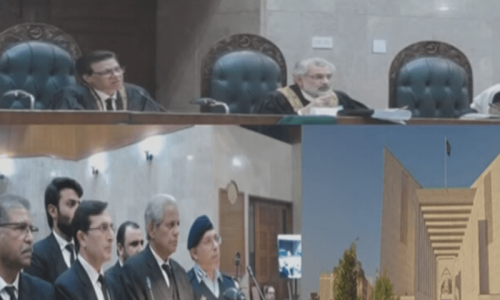On January 13, a three-member bench of the Supreme Court, headed by Chief Justice of Pakistan (CJP) Qazi Faez Isa, delivered a verdict in favour of the Election Commission of Pakistan (ECP). The ECP had challenged a judgment of the Peshawar High Court, ordering ECP to hand back the election symbol of Pakistan Tehreek-i-Insaf (PTI) to the party. The symbol had been withdrawn when PTI failed to meet certain conditions that the ECP has made mandatory for political parties.
The moment Justice Isa announced his verdict, social media sites exploded with angry rhetoric and bawling laments. This was expected from PTI supporters but, incredibly, their jeremiads were actually drowned out by the much more animated exhibitions of outrage by certain journalists, lawyers and activists.
These folk are fond of imagining themselves as puritans of democracy. That’s fine. But whereas one was expecting an informed critique from them on the verdict, all one got were rhetorical declarations denouncing a top judge who had apparently facilitated the ‘undemocratic’ designs of the military establishment (ME).
Interestingly, during the hearing, which was being streamed live, the eventual critics of the verdict were publicly complaining that PTI’s lawyers were not well-prepared. The party’s lawyers just couldn’t go beyond making claims of how PTI’s jailed leader Imran Khan was ‘the most popular politician in the country’ and that a verdict in favour of the ECP would damage democracy.
Following the January 13 Supreme Court verdict against the PTI, the ‘puritans’ of democracy decided to paint Chief Justice Qazi Faez Isa as the new anti-democracy villain, without offering any meaningful arguments for doing so
Isa is a no-nonsense judge. He enjoys complex discourses, as long as these are rooted in the Constitution and navigated by sound judicial logic. PTI lawyers were putting more effort in trying to use the televised occasion for grandstanding and for portraying the party as a victim of conspiracies, than in providing well-reasoned arguments.
Yet, despite this being in full view for all to see on TV, a lot of lawyers, journalists and activists threw up their hands and just couldn’t stop decrying the verdict. It was as if they were expecting their once favourite judge to demonstrate sympathy for the sake of providing a ‘level playing field.’ This really was the crux of their argument.
The CJP has a laudable history of fighting a long judicial battle against certain senior judges and high ranking military officers who wanted to oust him but failed. As I mentioned in a previous column of mine titled The Lament of the Political Romantics, the kind of folk that I am earnestly trying to figure out here are, by nature, political romantics. So, they began to imagine Justice Isa as a judicial messiah who would ride in on a white horse and vanquish meddlesome generals.
Justice Isa is heavily invested in delivering verdicts that best manifest the word and spirit of the Constitution and the law of the land. There was nothing undemocratic about the verdict. The onus of PTI’s defeat in this context squarely lay on certain blunders committed by the party and its lawyers.
How on earth was a judge such as Justice Isa expected to ignore the many obvious deficiencies in the ‘arguments’ presented by PTI’s lawyers, and then extend some extrajudicial sympathy to the party ‘for the sake of democracy?’ The mind boggles.

The manner in which the romantics reacted was largely about them feeling jilted by a scenario in which a conceptual reality that they had created clashed with an empirical reality, and crumbled. But this alone was not the reason. Nor was it just about an intense concern for the wellbeing of Pakistani democracy. I’m sure each one of them is the world’s greatest lover of democracy, but there was something else at play as well. Let me explain.
In a 2008 essay, the Italian sociologist Gianpietro Mazzoleni wrote: “News values and business goals promote populist leaders, creating a kind of complicity between the press and these politicians.” In a 2023 essay, the Brazilian journalist Giulia Sbaraini Fontes posited the same. By this they do not mean media groups that overtly support populist politicians, and vice versa, but those who overtly oppose them.
Both Mazzoleni and Fontes are of the view that populist leaders are often hostile towards mainstream media. But news organisations, as private companies, eventually benefit from this. The more a media group is attacked by a populist, the more it exhibits itself as a ‘defender of democracy’ and, therefore, the more it focuses on news related to the populist. This aids the group in attracting a larger audience.
For example, Fontes wrote that Brazilian newspapers that were being scathingly criticised by populist politician Jair Bolsonaro saw an increase in their circulation. The newspapers began to position themselves as defenders of Brazilian democracy. But, according to Fontes, to underline their ‘pro-democracy’ credentials, these newspapers began to increasingly focus on publishing news about Bolsonaro. Ironically, this actually elevated Bolsonaro’s populist appeal and helped him win the 2018 Brazilian presidential election.
To Mazzoleni and Fontes, when media groups (and individual journalists or activists) are attacked by populists, they highlight these attacks as a way to position themselves as defenders of democracy. This helps them attract a larger audience. But the more they speak about their democratic credentials, the more they have to speak about the populist. This becomes a cynical cycle which benefits both the adversaries, but not necessarily democracy.
In a surreal twist, the meltdown witnessed on January 13 among the romantics was also about them latching on to the coattails of a former ‘oppressor’, Imran Khan, and creating for themselves a new ‘threat’ to democracy. To sustain their democratic credentials, the romantics required a new foe. With the former oppressor now in jail, Isa became the new enemy. Secondly, the vlogs, columns and social media posts of the outraged witnessed a massive surge in viewership, readership, ‘likes’ and reposts.
The puritans of democracy decided to paint Justice Isa as the new anti-democracy villain without offering any meaningful argument beyond the rhetorical demand for a ‘level playing field’ and the usual anti-ME tirades. Nor have they presented any convincing evidence whatsoever to link Isa’s verdict to ME’s diabolical ‘plan’.
Whereas the romantics might enjoy a temporary surge in their online ‘popularity’, this will further strengthen the following notion: a puritanical disposition, too, can become a ploy enacted to boost one’s own not-very-ideological interests.
It’s not a very honest idea to continue playing the holier-than-thou role. Empirical reality can very easily bring it into question.
Published in Dawn, EOS, January 28th, 2024














































Dear visitor, the comments section is undergoing an overhaul and will return soon.